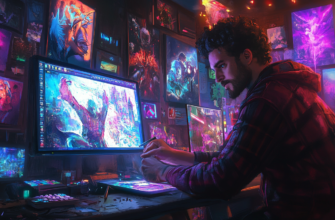- The unseen heroes: Women’s contribution and influence in video game development
- Why women’s contributions to the gaming world matter
- Breaking the myth of male-dominated game development
- Women in game development: key contributors and milestones
- 1. Carol Shaw – The first female game developer
- 2. Roberta Williams – Pioneer of the adventure genre
- 3. Amy Hennig – Shaping the modern AAA experience
- Steps to recognizing and supporting women’s contributions in gaming
- The ongoing challenges women face in the gaming industry
- Tangible benefits of a diverse gaming industry
- Conclusion: A richer gaming landscape thanks to women’s contributions
The unseen heroes: Women’s contribution and influence in video game development
When most people think about video games, the usual image is often male-dominated—both from the perspective of the player base and the industry itself. However, the reality is far more diverse. Women have played pivotal roles in the creation and evolution of the gaming world, contributing as developers, designers, writers, and even conceptual thinkers. Despite the male-centric perceptions, female game developers have left an indelible mark on the industry, crafting experiences that millions of gamers enjoy today.
As a fellow gamer, I find this subject especially compelling. Whether you’re new to gaming or you’re a veteran who’s been in the scene for a while, understanding the role of women in game development enriches your appreciation for the games we play. Without the efforts and talents of numerous passionate women in the industry, gaming just wouldn’t be the same. The contributions they’ve made are worth celebrating—and I’m excited to walk you through some crucial moments and figures that helped shape gaming as we know it.
Why women’s contributions to the gaming world matter
It’s no secret that the video game industry has notoriously been seen as a “boys’ club.” However, over the years, women’s presence and achievements in gaming have significantly shifted this narrative. From shaping early arcade hits to modern-day AAA titles, women’s influence is everywhere.
Breaking the myth of male-dominated game development
Before diving into some concrete examples, it’s essential to break down the myth that video game development is a field dominated exclusively by men. In fact, lots of women have been central to game development since its early days. And with women becoming more visible in the industry, it’s important to highlight that their input isn’t limited to just one aspect of game creation.
Women in gaming have taken on virtually every role imaginable:
- Designers: Responsible for conceptualizing the gaming experience, creating gameplay mechanics, and shaping the visuals that define the worlds we explore.
- Programmers: These women write code that powers the games’ functionality, fixing bugs and ensuring everything runs smoothly.
- Narrative developers: Crafting compelling stories, characters, and dialogues that stay with players long after they’ve put down the controller.
- Producers: Overseeing the entire production process, making sure deadlines are met, resources are allocated, and the team functions cohesively.
Women in game development: key contributors and milestones
With the groundwork laid out, let’s explore some legendary women whose contributions to game development have been nothing short of game-changing. These luminaries have been critical to some of the most iconic game titles and franchises in history.
1. Carol Shaw – The first female game developer
Starting us off is Carol Shaw, widely acknowledged as the first female video game designer. Shaw started her career at Atari in 1978—an era when it was rare to find women working in technology, let alone gaming. One of her most famous works includes the 1982 classic River Raid, a title revered for its fast-paced gameplay and innovative level design.
“Women have the ability, creativity, and determination to contribute to video games just as effectively as anyone else,” Shaw once said, breaking down stereotypes and paving the way for future generations of women in the industry.
2. Roberta Williams – Pioneer of the adventure genre
Another prominent figure, Roberta Williams, co-founded Sierra On-Line and had a colossal impact on the adventure game genre. Her title King’s Quest (1984) set a precedent, blending compelling narrative and player choice with beautifully detailed worlds. Roberta’s games were among the first to introduce significant storytelling elements to video games, profoundly influencing the future standard of gaming narratives.
3. Amy Hennig – Shaping the modern AAA experience
With almost three decades in the industry, Amy Hennig is a powerhouse. Best known for her work on the Legacy of Kain series and the massively successful Uncharted franchise, Hennig’s narrative direction, and character-driven storytelling have turned her into one of the most respected voices in gaming.
Her work on the Uncharted series redefined the action-adventure genre by introducing complex characters, deeply human motives, and breathtaking cinematic sequences. It’s no stretch to say her approach introduced a higher standard for narrative-driven games.
Steps to recognizing and supporting women’s contributions in gaming
Want to help women in gaming get the recognition they deserve? It’s actually easier than you think. Here’s how you can contribute to supporting women in the video game industry as a gamer yourself:
- Explore games made by female developers: Look for titles created by women, even if you haven’t heard of them before. There are countless gems out there, and discovering them helps widen your scope of gaming experiences.
- Follow industry voices: Keep track of women’s voices in the gaming industry—both established figures and up-and-coming talents. Support them on social media and celebrate their work.
- Stand against toxicity: Unfortunately, women in gaming, whether developers or players, often face toxic behavior. Don’t be a bystander—if you see unfair treatment, stand up, and discourage it. Creating a positive and inclusive environment is essential for everyone.
- Support organizations: Donate to or participate in organizations that advocate for diversity and inclusivity in gaming, such as Women in Games or Girls Who Code.
The ongoing challenges women face in the gaming industry
Despite the progress, the road for women in gaming is still not without obstacles. One of the main challenges women face remains workplace discrimination and representation. Across many game studios, there’s still an imbalance in gender ratios, especially in leadership roles.
Another obstacle is industry-wide recognition. While the contributions of female game developers are significant, they often don’t receive the same level of attention or accolades as their male counterparts. Many pioneering women in gaming remain less well-known than their contributions might merit.
Regardless, as more women break into the industry—with some even starting their own independent game studios—the gaming space is continuing to evolve toward a more diverse and welcoming environment. There’s hope for a future where diversity in game development leads to even richer, more inclusive experiences for all gamers.
Tangible benefits of a diverse gaming industry
So, why should we, as gamers, care about women’s contributions to game development?
- Innovative storytelling: Women developers often bring fresh, emotionally resonant storylines to the table, offering new perspectives that might otherwise be overlooked.
- Diverse character representation: Female developers contribute to creating more diverse, relatable characters, breaking away from shallow stereotypes.
- Collaborative environments: Research shows that diverse teams often come up with more creative solutions to problems—meaning better, more innovative games for us to enjoy.
Conclusion: A richer gaming landscape thanks to women’s contributions
At the end of the day, the gaming world is as vibrant, innovative, and immersive as it is today thanks, in large part, to the unsung contributions of talented women in the industry. From designing unforgettable experiences to crafting stories that stick with us for decades, women have forever changed the scope of gaming. So, the next time you pick up your controller, mouse, or keyboard, think about the women behind the scenes who helped make your favorite games possible.
As gamers and lovers of this art form, let’s continue to support diversity in gaming—to nurture an industry where everyone’s voice can contribute to creating the amazing worlds we love to play in. If you’re still not convinced, go check out the incredible work of these fantastic female developers—you might just find a new favorite game!

















